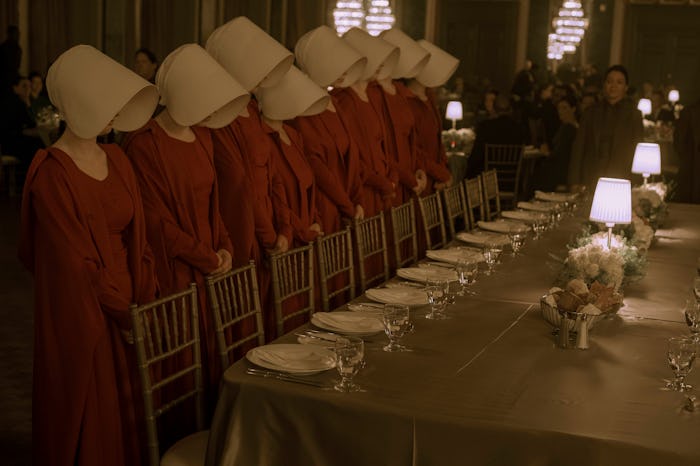Entertainment

'The Handmaid's Tale' Raises A Crucial Question
Fertility is of utmost importance in Gilead. With the birth rate declining worldwide in The Handmaid's Tale, the ability to conceive and carry a child to term is an asset, which was made clear in Episode 6, "A Woman's Place," when a trade delegation arrived in Gilead from Mexico hoping to barter for Handmaids. (Episode spoilers ahead!) To cement the deal during a dinner honoring the visiting diplomat, Serena Joy decided to show off how successful Gilead had been by bringing out all the children the Handmaids have given birth to. It was a ploy that certainly made it seem like Gilead was flourishing, but it also brought up questions. What happens to the children of Gilead on The Handmaid's Tale?
Serena Joy spoke of future generations, but it's not clear exactly how the Gileadan system can maintain itself for years to come. Healthy children are taken from their mothers, whether they were born in the time before or after, and given to Commanders and their wives to raise. But what happens to them when they grow up? One would assume that being reared by high-ranking officials would give those children a privileged position in society, but it's clear not all of them can grow up to become Commanders and wives themselves. What happens when Gilead needs to find new Handmaids?
Margaret Atwood's novel of the same name doesn't provide much information on the subject, but since the show is elaborating on the world of Gilead, it's possible these questions will be answered in future episodes. From Atwood's novel, it's clear that the only roles men can fill in Gilead are militaristic ones. Young men can become Guardians of the Faith (essentially police) or Angels (soldiers); they can be part of the secret police force, the Eyes of God, or they can find themselves in the highest position as Commanders of the Faithful.
How women would be divided in the future is less clear because they have a variety of (terrible) roles to fill that are highly dependent on their social class: Wives, Handmaids, Aunts, Marthas, Jezebels (sex workers), or Econowives (who carry on the functions of Wives, Handmaids, and Marthas). In the transition from the United States to the Republic of Gilead, those divisions were formed based on moral judgments. Handmaids were women who had behaved in ways deemed unacceptable (Moira was a lesbian; June was an adulteress because her marriage to Luke was his second and only first marriages were recognized), but could still be useful because of their healthy ovaries. If all the female children are taken in by those in the highest strata of society, how does Gilead determine who takes on those other roles?
Perhaps they'll take a nod from all those other highly regimented dystopian futures speculated about in YA novels: at a certain age, there can be some kind of bizarre ritual that lets them know exactly which color-coded position they're destined to take on.